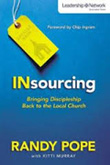Latest
-
Objections to the Christian Faith from the Unchurched and De-Churched
 Tue Dec 02, 2014
Tue Dec 02, 2014
by Resurgence -
Craig Groeschel: We Innovate for Jesus
 Tue Oct 14, 2014
Tue Oct 14, 2014
by Resurgence -
Mark Driscoll: Revelation
 Tue Oct 07, 2014
Tue Oct 07, 2014
by Resurgence -
RESURGENCE LEADERSHIP #034: JOHN PIPER, WHY I TRUST THE SCRIPTURES, PART 2
 Tue Sep 30, 2014
Tue Sep 30, 2014
by Resurgence -
Resurgence Leadership #033: John Piper, Why I Trust the Scriptures, Part 1
 Tue Sep 23, 2014
Tue Sep 23, 2014
by Resurgence

Archives
Bringing it all back to discipleship

Making disciples might not carry the same luster as other church ambitions, but robust discipleship often is the most fertile ground for leadership development.
 To go and make disciples is the mission that Jesus has given us (Matt. 28:19)—but how do we do it? In his book Insourcing: Bringing Discipleship Back to the Local Church, Randy Pope shares his story as an experienced practitioner who has been a part of many different ministry models since planting his church 30 years ago.
To go and make disciples is the mission that Jesus has given us (Matt. 28:19)—but how do we do it? In his book Insourcing: Bringing Discipleship Back to the Local Church, Randy Pope shares his story as an experienced practitioner who has been a part of many different ministry models since planting his church 30 years ago.
Perimeter Church started at the twilight of the traditional pastoral ministry model, and Pope was an influential leader and example in the attractional church ministry model (“Come to us”) and also in the missional ministry model (“We go to you”). Yet a number of years ago he decided to lead his church in a direction that was not new per se but rather quite old: life-on-life missional discipleship groups (LOLMD).
Target practice
If you’re going to take a shot, you first consider the target. (p. 28)
By all outward measurements, Pope’s Atlanta church was successful and doing well. “We were being celebrated and applauded, held up as an example of innovation, but for all the wrong reasons. The accolades we’d received were not because we’d hit an appropriate target but because the distance we’d shot impressed people” (p. 13). Pope realized that the target ought to be the maturing and equipping of their people. Since that was the goal, Pope decided to start seeing how that was being done around his church.
But our most important questions weren’t sparked by the models at all. They had more to do with the people themselves. Because after the model has been relegated to the storage unit or the dumpster, the people will still be here. So we asked, were our people becoming the right kind of people. (p. 26)
Sidetracked by ‘success’
Pope starts by asking that we look at our ministry models as “vehicles” and ask if they are taking us to our target of equipping people to make disciples (p. 84). He argues that often the allure of success sidetracks us from impact:
What is the purpose of the vehicles, or models, your church employs? Is it success, something that can be gauged by numbers and buildings, and programs? Or is it impact, something that can be measured only by truthfully examining the lives of your people and the lives of the people they touch? Let’s say you want to be a church of impact. Do you own a vehicle that can get you there? . . . For too long the church has focused on numerical growth—which may well be the most accurate church-ese word for success—instead of on healthy impact. . . . A healthy child will grow, but it isn’t always true that a growing child will be healthy. (pp. 89–90)
Pope’s concern is that success, as it is often defined in the church, can lead us to fail in discipling and equipping people because making disciples might not carry the same luster and prominence as other church ambitions. Pope notes that the latter types of church “success” are even more dangerous because of how apt other churches and pastors are to want to imitate it, “You know the pattern. A church stuns its peers with some unprecedented practice or program. Other churches can’t help but notice the splash. It looks like it works. Before you know it, everyone is doing the same thing. The end seems to justify the means. If it works (appears successful), give it a try” (p. 88).
TEAMS work
Pope began to observe how men in the groups he was leading were already being discipled and saw five common emphasis for hitting the target, forming the acronym TEAMS:
Truth
Equipping
Accountability
Mission
Supplication
Each one of these emphasis has an instructional element that allows people to thrive in their spiritual formation: Equipping = coaching, Accountability = support, Truth = directing, and Mission = delegating. Pope argues that this model has helped them hit their target because many churches go right from giving directives to delegating to their people. When you leave out coaching, and support for people as they grow in using their spiritual gifts and being on mission, you end up creating “disillusioned learners” (p. 38). Rather with ongoing, direction, coaching, support, and delegation, Pope states they have seen multiplication of disciples making disciples (p. 136).
Tested and true
One of the most helpful things about Insourcing is that it is tested. Pope began implementing it at his church in 1997 and has had an extended season to see the fruit of it in his church. Yet he still speaks with the humility of saying, “The day our particular version of discipleship ceases to point people to Jesus will be the day it becomes an idol” (p. 189). Along the way he notes a few other interesting things for church leaders to pay attention to:
- On the leadership of his church, “They became leaders during the process of discipleship. Life-on-life is not a program we launched but rather a movement that we seeded. These men—and most of our women in leadership as well—grew out of discipleship” (p. 92). Robust, relational discipleship often is the most fertile ground for the development of leaders.
- On evangelism and mission in his church, “The motivation that propels the masses out into the world and leads to lasting spiritual growth isn’t a pep rally: it’s a huddle (p. 114).
- Many of the leaders we need are already in our church but just need to be invested in, “Discipleship is not a factory for cranking out healthy Christians; it is a laboratory for reproducing leaders. . . . Our leadership base for everything else we do as a church is broadening because we no longer recruit leaders; we reproduce them (p. 150).
Insourcing shows the fruit of a seasoned pastor who has wrestled hard with the important questions of discipleship and leadership for decades. The book is full of insights on what really matters in church ministry, creating a discipleship culture, and what it really looks like to see people equipped to make disciples from a man who has been faithfully serving the church for years.